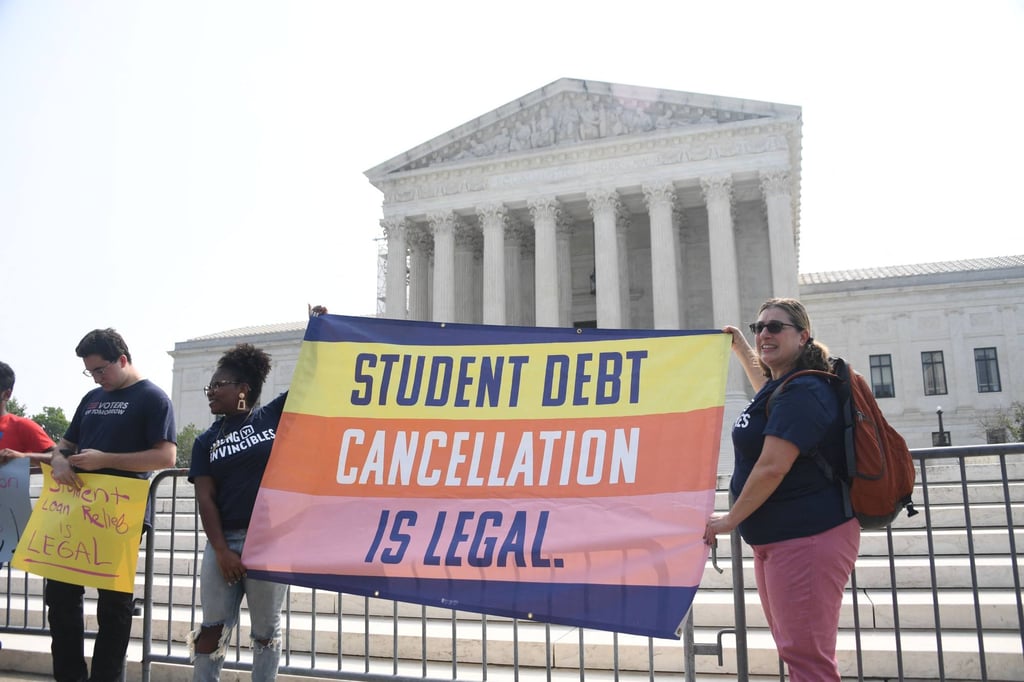In the twilight of American institutions, US President Joe Biden recently stepped forward with a proposal that, while unlikely to see the light of legislative day, deserves a serious hearing.
Biden’s proposed sweeping changes to the Supreme Court – a proposal for term limits on justices, a binding code of conduct and a constitutional amendment that would undo a controversial decision by the court that grants US presidents wide immunity from criminal prosecution – have been met with predictable derision from Republicans.
Republican House Speaker Mike Johnson said the proposal would be “dead on arrival in the House”. The predictable resistance should not obscure a crucial truth: the Supreme Court is on the brink of crisis. Biden’s reforms are an overdue response to the unravelling of one of the last American bastions of public trust.
The Supreme Court has become embroiled in scandals and decisions that have shattered its reputation. The most glaring examples are not just the decisions that stoke ideological fires, but the ethical quagmires that have ensnared some of the court’s most prominent justices.
Justice Clarence Thomas has found himself at the centre of a storm. Reports that Thomas accepted lavish gifts from billionaire benefactors with interests before the court raise the spectre of bribery. Between 2004 and 2023, he reportedly received gifts worth more than US$2.4 million. Other justices received gifts worth six figures.

Then there is Virginia Thomas, the justice’s wife, whose overt support for Donald Trump’s baseless claims of election fraud brings into question the very independence of her husband’s judgment. When a justice’s spouse is engaged in attempts to challenge an election’s legitimacy, can the public be faulted for wondering where the justice’s loyalties lie?
According to Gallup, public confidence in the Supreme Court has plunged to 43 per cent, a stark contrast to the 62 per cent approval rating at the dawn of the millennium.
Adding fuel to this fire is Trump, who has taken a sledgehammer to the credibility of the judiciary. When the court refused to validate his outlandish claims of a stolen 2020 election, Trump lashed out, accusing the justices of lacking “wisdom” and “courage”. Such attacks are not merely the tantrums of a sore loser; they are a deliberate strategy to undermine any institution that dares to check his ambitions.
Trump’s rhetoric, combined with his success in appointing three justices during his term, has cemented the perception that the court is now a political instrument rather than an impartial arbiter. This perception was only heightened by the court’s ruling to overturn Roe vs Wade and dismantle nearly 50 years of established precedent on reproductive rights. To millions of Americans, this decision reflected a court realigned by Trump to execute a political agenda.

Against these backdrops, Biden’s proposals for Supreme Court reform are not only reasonable but necessary. The idea of term limits for justices is a reform whose time has come. Today, life-term rule can mean decades of influence by a single individual, often long after the societal consensus has shifted.
Similarly, a binding code of conduct for justices would address the glaring ethical lapses that have increasingly tainted the court’s reputation. Unlike lower court judges bound by a code of ethics, Supreme Court justices essentially operate without formal ethical constraints.
Biden’s proposed reform to deny immunity for crimes committed by a former president while in office is a necessary reaffirmation of the principle that the president is not a king who is above the law.
But let’s be clear: these reforms are unlikely to pass. Republicans, who benefit from the court’s conservative majority, are in no hurry to alter the status quo. Yet, the necessity of these reforms remains. Trust in the executive and legislative branches is already dismally low.
A staggering 81 per cent of Americans disapprove of the US Congress, while the approval ratings of the executive have steadily declined ever since Bill Clinton left office in 2001. If the Supreme Court is also perceived as merely another political entity, the implications for the republic are profound.
America’s founding fathers envisioned a government of checks and balances, where no single branch could dominate the others. What happens when people lose faith in all three? When the executive is considered overreaching, the legislature as ineffective and the judiciary as compromised, the foundation of the republic is at risk. Without trust, the rule of law is undermined.
In a letter to Thomas Jefferson, John Adams noted that “power must never be trusted without a check”. The Supreme Court faces that very test. Will it rise to the challenge or continue down a path that leads to further erosion of trust?
Biden’s proposed reforms are not a panacea, but a necessary first step towards restoring trust in the institutions. Conversely, to dismiss it out of hand is to ignore the perilous state of American democracy.
Thomas O. Falk is a journalist and political analyst who writes about German, British and US politics



